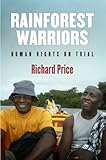Rainforest Warriors : Human Rights on Trial / Richard Price.
Material type: TextSeries: Pennsylvania Studies in Human RightsPublisher: Philadelphia : University of Pennsylvania Press, [2011]Copyright date: ©2011Description: 1 online resource (280 p.) : 41 illusContent type:
TextSeries: Pennsylvania Studies in Human RightsPublisher: Philadelphia : University of Pennsylvania Press, [2011]Copyright date: ©2011Description: 1 online resource (280 p.) : 41 illusContent type: - 9780812243000
- 9780812203721
- Human rights -- Suriname
- Human rights -- Suriname
- Saramacca (Surinamese people) -- Civil rights
- Saramacca (Surinamese people) -- Legal status, laws, etc
- Saramacca (Surinamese people) -- Civil rights
- Saramacca (Surinamese people) -- Legal status, laws, etc
- Human Rights
- SOCIAL SCIENCE / Anthropology / General
- AF
- Anthropology
- Folklore
- Human Rights
- Law
- Linguistics
- online - DeGruyter
- Issued also in print.
| Item type | Current library | Call number | URL | Status | Notes | Barcode | |
|---|---|---|---|---|---|---|---|
 eBook
eBook
|
Biblioteca "Angelicum" Pont. Univ. S.Tommaso d'Aquino Nuvola online | online - DeGruyter (Browse shelf(Opens below)) | Online access | Not for loan (Accesso limitato) | Accesso per gli utenti autorizzati / Access for authorized users | (dgr)9780812203721 |
Browsing Biblioteca "Angelicum" Pont. Univ. S.Tommaso d'Aquino shelves, Shelving location: Nuvola online Close shelf browser (Hides shelf browser)

|

|

|

|

|

|

|
||
| online - DeGruyter Anthropology Through a Double Lens : Public and Personal Worlds in Human Theory / | online - DeGruyter The Bohemians. | online - DeGruyter Witchcraft and Magic in the Nordic Middle Ages / | online - DeGruyter Rainforest Warriors : Human Rights on Trial / | online - DeGruyter Along an African Border : Angolan Refugees and Their Divination Baskets / | online - DeGruyter Beer in the Middle Ages and the Renaissance / | online - DeGruyter Exposés and Excess : Muckraking in America, 19 / 2 / |
Frontmatter -- Contents -- Preface -- Africans Discover America -- Land, Spirits, Power -- Earth, Water, Sky -- The Dam at Afobaka -- Rockets at Kourou -- Sovereignty and Territory -- The Aloeboetoe Incursion -- The Moiwana Massacre -- Trees -- Resistance Redux -- Initial Protests -- The Depredations Continue -- Judgment Day -- Pre-Hearing Pleadings -- The Hearing -- The Judgment -- American Dreams -- Developments on the Ground -- Broader Implications -- Postface -- Notes -- References Cited -- Illustration Credits -- Acknowledgments
restricted access online access with authorization star
http://purl.org/coar/access_right/c_16ec
Rainforest Warriors is a historical, ethnographic, and documentary account of a people, their threatened rainforest, and their successful attempt to harness international human rights law in their fight to protect their way of life-part of a larger story of tribal and indigenous peoples that is unfolding all over the globe.The Republic of Suriname, in northeastern South America, contains the highest proportion of rainforest within its national territory, and the most forest per person, of any country in the world. During the 1990s, its government began awarding extensive logging and mining concessions to multinational companies from China, Indonesia, Canada, and elsewhere. Saramaka Maroons, the descendants of self-liberated African slaves who had lived in that rainforest for more than 300 years, resisted, bringing their complaints to the Inter-American Commission on Human Rights.In 2008, when the Inter-American Court of Human Rights delivered its landmark judgment in their favor, their efforts to protect their threatened rainforest were thrust into the international spotlight. Two leaders of the struggle to protect their way of life, Saramaka Headcaptain Wazen Eduards and Saramaka law student Hugo Jabini, were awarded the Goldman Prize for the Environment (often referred to as the environmental Nobel Prize), under the banner of "A New Precedent for Indigenous and Tribal Peoples."Anthropologist Richard Price, who has worked with Saramakas for more than forty years and who participated actively in this struggle, tells the gripping story of how Saramakas harnessed international human rights law to win control of their own piece of the Amazonian forest and guarantee their cultural survival.
Issued also in print.
Mode of access: Internet via World Wide Web.
In English.
Description based on online resource; title from PDF title page (publisher's Web site, viewed 24. Apr 2022)


